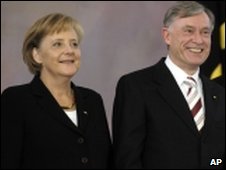|
|
|
|
|
|
|
News & Views item - November 2009 |
![]() German Chancellor's New Coalition Reaffirms Support for Science and University
Research. (November 6, 2009)
German Chancellor's New Coalition Reaffirms Support for Science and University
Research. (November 6, 2009)
 Angela Merkel & Guido Westerwelle |
Last week, following the re-election of the Christian Democrats (CDU/CSU) leader Angela Merkel as German Chancellor she chose the Free Democrats (FDP) led by Guido Westerwelle to be her coalition partner. He will serve as vice-chancellor and Germany's Foreign Minister.
According to Nature, Annette Schavan (Christian Democrats) will remain in charge of the ministry of research and education while Thomas Rachel will probably continue as her deputy for research. This is taken to indicate that the increasing support for German research and higher education is likely to continue, i.e. "the budgets of major research organizations, including the Max Planck Society and the DFG, Germany's main research granting agency, will rise by 5% a year until 2015. Universities will receive a €5-billion [A$8.1-billion] supplement between 2011 and 2015 to improve teaching and research".
In addition the carrot of the €2.7 billion promised for the period 2012–17 for the Excellence Initiative to up the rankings of German universities is to continue. And finally, Nature reports: "The four-year, €14.6-billion 'high-tech' programme that promoted applications in areas such as energy, climate, health and security — and that would have expired this year — will be extended and expanded."
Dr Merkel has also promised that the government will allow the nation's research institutions to have greater autonomy in handling their budgets.
Jörg Hacker, head of the Berlin-based Robert Koch Institute and president-elect of the Leopoldina, Germany's national academy says: "We are mostly satisfied, particularly by the increases in budget," but added, "We hope that it will all work out as the coalition agreement plans."
On the other hand Oliver Brüstle, a stem-cell researcher at the University of Bonn told Nature: "Relaxing rules [as regards research utilising stem cells] to match those of some other big players in Europe, such as Switzerland, would make things a lot easier for us because we collaborate so much with European partners."